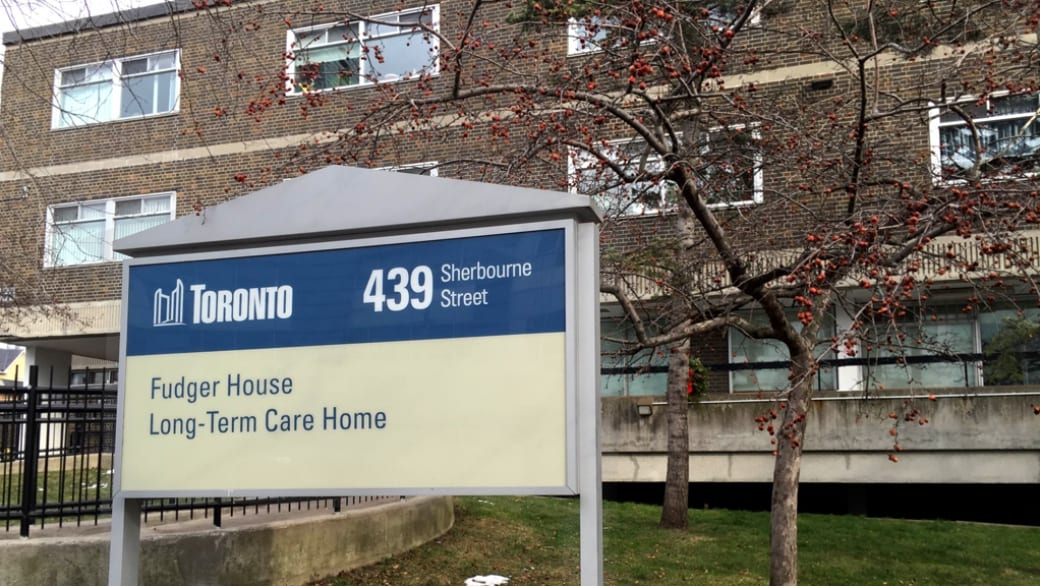Fudger House, Toronto’s de facto LGBT nursing home, with visible queers among its staff, residents and volunteers, was most definitely on the chopping block. But the community spoke out — perhaps the city listened. And for now, it appears that Fudger House has been saved.
After many months of hearing statements that made the Fudger House’s demise sound like a done deal, a recent city staff report left those fighting to save the nursing home unsure whether or not to celebrate: the report states that “Fudger House, a 250 bed home, will remain in operation until all other redevelopment projects are complete (estimate 2029).”
But there are new rules for nursing homes, and those not up to snuff must upgrade in order to stay operational. Toronto owns 10 long-term care homes and plans to reduce that number to eight — of those, six need to be updated. Fudger House is one of those homes. But, built in 1965 then renovated in 1995, it does not currently meet modern standards, and there is no budget or construction date currently in place to bring it up to code.
The city’s Long-Term Care Homes and Services (LTCHS) presentation last February at The 519, Toronto’s LGBT community centre, was meant to convince a room filled with members of the Senior Pride Network that all other city-run nursing homes in the suburbs would be just as gay friendly as Fudger House. And that got people riled up.
The city also proposed that Fudger House residents could be moved to the new George Street facility, a planned addition that is a part of the George Street Revitalization project. That new facility will hold an estimated 378 long-term care beds, along with emergency shelter, transitional assisted living, affordable housing and services. That would mean moving elderly queers into a very large nursing home that wouldn’t specialize in the needs of LGBT people, and into an area where many queer people would not feel safe.
For those who’ve lived a queer life, surviving the discrimination faced as children and teens forged adults who had to fight for equal rights, for treatment during the AIDS crisis and more. Some elders now find themselves with a seat at the table at Fudger House, or perhaps are outside looking in. No matter what perspective you look from, there is a need for long-term care that recognizes and supports the diverse LGBT community that flies the rainbow flag. And a rainbow flag has been flying at one, and only one, nursing home in Toronto for a long time. For many LGBT seniors, losing Fudger House would have been disastrous.
For those who assume you’ll be treated with dignity anywhere you go, a trans woman friend of mine was taken off estrogen in the cardiac unit of a downtown Toronto hospital long before she became the only queer trans person in an entirely straight nursing home in downtown Toronto. Some feel forced into the closet when they reach a nursing home because of the discrimination. If one in 10 are gay, there should always be visible queers everywhere. But there aren’t. Imagine gay couples being separated when they age, because a nursing home doesn’t respect their relationship? Who do they have to help them fight? Not everyone is officially married. Not all want to buy into the heteronormative.
Barry Birnberg, 76, was one of the concerned people who attended the February meeting at The 519. “I remember the Stonewall riot in New York City and the reactions we showed to the Toronto police bathhouse raids. We need to be activists not nice guys,” he says. “I think that meeting was the first time they saw there were enough activists that they would have to listen.”
Eleanor Batchelder, 75, a member of the Senior Pride Network and the Older Women’s Network, shares a different positive outlook.“I don’t think we did much that had a direct effect on the happy outcome. We had meetings and talked about possible short-term and long-term actions we could take,” she says. “We counted on there being enough people to make a big fuss.”
Not everyone feels cause to celebrate. “The only concrete recommendation that changed for me from the original proposals was that [. . .] maybe something would emerge in the coming years where [Fudger House] may still have some other functions that might relate to the LGBTTQ community,” says Jack Harmer. Harmer, a former volunteer at The 519 and LTCHS advisory committee, was part of the team that helped create a tool kit that provides guidelines for homes to be more welcoming to LGBT folk. Fudger House can provide beds while the other homes are being renovated. But beyond that, its future becomes uncertain.
Being queer means belonging to a distinct community that bridges ethnic and religious backgrounds. Granted, the report does mention “lesbian, gay, bisexual and transgendered (LGBT) supports” need to be offered in every home — along with dental care, optometry and laundry. We’re considered among services provided, which is so much more than other homes offer. But it isn’t enough.
“I thought one of the main, hoped-for objectives was to save some or all the long-term care, provincially designated beds at Fudger House,” Harmer says. “None of the long-term care beds were saved for Fudger or a redeveloped long-term care facility adjacent to the LGBTTQ community.”
“The George Street project is the catalyst for long-term care redevelopment,” says Jennifer Wing, senior communications coordinator with the City of Toronto.
“The George Street project does not impact the operation of Fudger House. And Fudger House is the last home addressed in the current Capital Renewal Plan that the City will redevelop/revitalize. As indicated in the approved Council Report, this does include the possibility of repurposing [Fudger House], but that will be determined over the next 15 or so years and only after there has been extensive consultation and study conducted.”
Real estate in the Church-Wellesley Village has reached a new high. Zipperz, the cabaret bar in the area, is slated to close by the end of 2015 in order to make room for condo development. A real community concern is that the City will sell the building that houses Fudger House to turn a tidy profit.
Attachments at the end of the the report include references to Fudger House’s future, including that, “consideration will be given to possible alternative City use of property and building,” and that the “plan allows time to explore interest and partnership opportunities with the LGBT community to open a long-term care home or repurpose for alternative case such as palliative, hospice or assisted living.”
But for now, any celebration within the community has been muted. Is this a victory? Or are we simply being placated while the city buys enough time to silence us? With no budget or scheduled renovation like the other homes sitting on less valuable real estate, there’s nothing to fight against until 2029. But we haven’t lost. At least the only home that has been welcoming queers for years will continue to exist — for now. Perhaps this is a victory. But it requires continued vigilance by all of us.
Has Fudger House been saved?
For now.


 Why you can trust Xtra
Why you can trust Xtra


